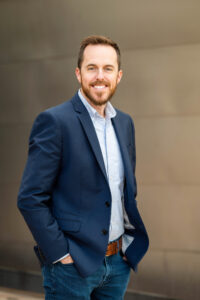Our first instinct to act in a trying situation is usually an anxious response, rather than a helpful one. Losing our temper, insisting on having the last word, demanding everyone’s attention, blazing forward without pausing to think, acting before hearing multiple perspectives—these are all anxious responses. Many of us are uncomfortable with silence and inaction, so we often multiply the anxiety in the room rather than quieting it. As Christians, how can faith shape our response to anxiety, and what does it look like to live healthy, integrated lives?
In 2019, author and podcast host Steve Cuss shared about anxiety in organizations at Thriving Churches, Thriving Cities, a Denver Institute event for pastors and ministry leaders. Steve talked about how to identify the sources of chronic anxiety, how to pay attention to the ways that anxiety manifests in our bodies, and offered practical tools and exercises to develop emotionally healthy leadership patterns.
Below are a few highlights from his talk, along with guided questions for reflection. Steve recently joined DIFW for “Managing Anxiety: Yours & Theirs,” a new course at The Faith & Work Classroom created in partnership with RightNow Media.
Why pay attention to our anxiety? While anxiety can’t be totally avoided, Steve says, it’s crucial that we learn to notice it because if we don’t, we will burn out. Not only that, anxiety has a spiritual dimension that has the capacity to wreak havoc on our ministries, our organizations, and our lives:
Anxiety is actually a spiritual, dark force that gets ahold of us and pulls us down a dark path to death. I mean it literally. Chronic anxiety kills us.
Steve CussThe good news is that the Gospel can free us from anxiety’s grip, but it’s a hard-fought path to freedom. As Steve assures us, "you can actually experience the grace of God in the midst of tremendous pressure."
Reflect:
Most of us don’t recognize that we’re anxious until we’re very anxious. How do we catch our anxiety before it spirals out of control? The first clue, Steve explains, is physiological—learning to pay attention where anxiety begins in the body.
According to Steve, anxiety starts in one of three places: a spinning mind, a racing heart, or a tightening gut. When your thoughts are sprinting, your chest is pounding, and you feel a sickening feeling in your gut, you can be sure that you’re experiencing anxiety.
Reflect:
Chronic anxiety, according to Steve, shows up when we don’t get something we think we need. For Steve, anxiety ensues when people perceive him as stupid, when a stranger disapproves of his actions, or when he feels that he is not liked. Most of us can probably identify with these insecurities.
So, to begin tackling anxiety, we need to be clear that it’s seeking to lure us into trusting in idols of our own making. As Steve puts it:
Anxiety shrinks the power of the gospel because it presents a false gospel—one of self-reliance rather than reliance on God.
Steve Cuss, Managing Leadership AnxietyWhen we name our anxiety, we begin to shift the power dynamic. Of course, this does not mean that we’ll never experience anxiety. But it does mean that anxiety will no longer have us in its grip; instead, we’ll have anxiety in our grip.
Reflect:
So, perhaps we don’t change because we’re afraid to externalize what is making us anxious, or because we’re fearful that our lives will get worse, not better, if we try something new. However, Steve suggests that we don’t change, first and foremost, because we’re unwilling to put our false selves to death—if we even realize that we have a false self.
Thomas Merton, Christian spiritual writer and monk, described the false self as “an illusory person” who shadows us in all of our decisions, deceiving us into wanting things we shouldn’t want or making us believe we need things that we don’t need.
The Gospel can put this false self to death—if we let it. That’s the path to true freedom:
This is how dying to self actually works. We notice our anxiety, we prayerfully name its source to God, and we rest free in our identity in Christ and his work instead of what we think we need.
Steve Cuss, Managing Leadership AnxietyReflect:
One of the keys to effective and emotionally healthy leadership is knowing where you end and other people begin. In his landmark leadership book A Failure of Nerve, Edwin Friedman referred to this technique as “self-differentiation.”
A differentiated leader practices the difficult skill of remaining fully oneself while staying connected to another person in such a way that the leader’s anxiety doesn’t spill over onto others and others’ anxiety doesn’t infect the leader.
Obviously, this is easier said than done. But it’s critical that leaders self-differentiate because codependency (no differentiation at all) is toxic and dysfunctional while detachment (total differentiation) can be cruel. Both ends of the extreme produce anxiety.
Reflect:
To learn more about Steve Cuss and his work on anxiety, visit CapableLife.me, or check out Steve’s interview at The Faith & Work Podcast. You can also learn more at our new course, “Managing Anxiety: Yours & Theirs.”

Dustin previously served as the director of communications for Denver Institute of Faith & Work, with prior communications and marketing experience at the University of Colorado Boulder and Wycliffe Bible Translators. He holds an M.A. in Communication from the University of Colorado Denver and a B.A. in Political Science from the University of Florida. He and his family attend Storyline Church in Arvada.